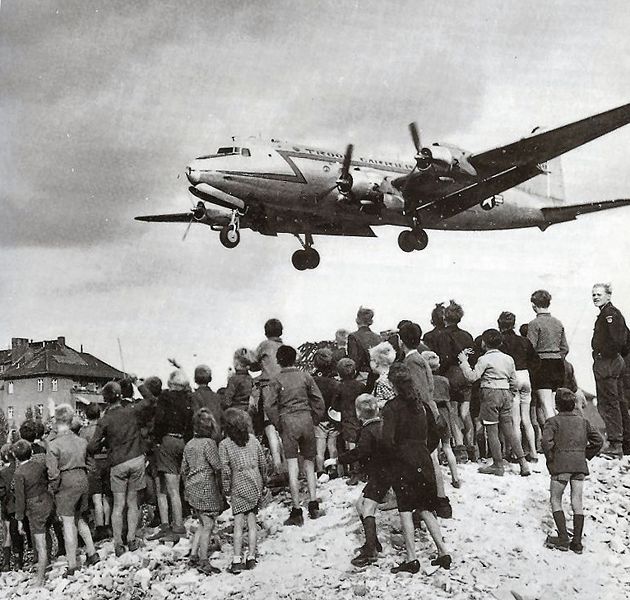
The C-54 Skymaster had a 14 ton load capacity. USAF Photo 070119-F-0000R-101.
The Blockade
On 24 June 1948 the Soviet Union blocked all communication routes, air, rail, and road, between the occupied city of West Berlin and the outside. The intentions were to force the Western powers to concede Soviet control over the entire city. It was the first serious Cold War confrontation between former wartime allies of the East and West. What followed was a dangerous game of brinksmanship that witnessed the establishment of a military air corridor by direction of President Harry Truman. The purpose was to demonstrate resolve in the face of threats. For almost one year allied airforces maintained around the clock resupply of the city delivering cargoes as diverse as food, clothing, machinery, and coal. Against the backdrop of one of the worse winters ever visited on Europe the Berlin Airlift maintained the freedom and morale of West Berlin.
The Crisis Begins
"Even the supply of medicine for sick persons and milk for little babies was stopped." -Willy Brandt, future Chancellor of West Germany
In the early morning hours of 24 June 1948 the Soviets severed all land, water, and rail routes between the non-Soviet zones and Berlin. For a limited time only some limited non-military traffic from West Berlin to the Western zones was permitted via a 23 kilometer detour to a ferry crossing. Additionally, the Soviets cut off all electricity supplied to West Berlin from generating plants in the Soviet zone. Only air corridors remained open. Left with only a month's worth of food and coal the situation appeared desperate. In reaction to what would develop as the first major military crisis of the Cold War US Secretary of State George Marshall sent a measured protest to the Soviet Ambassador on 6 July 1948. In part it read: "The United States Government is therefore obliged to insist that in accordance with existing agreements the arrangements for the movement of freight and passenger traffic between the western zones and Berlin be fully restored."1
Soviet Intentions
Sensing that the Western allies, particularly the United States and Great Britain, intended to establish a separate government in West Germany and consequently West Berlin the Soviets acted to forestall this initiative. They implemented the blockade to confront the West with a difficult choice: either surrender control of the city to the Soviets or abandon the plan for a separate West Germany. The Soviets wanted to prevent the formation of an independent German republic that might be included in the Western bloc and come under control of the United States. But Stalin's actions were unheralded:
Nothing he had done since the war had been quite so daring. If the Americans were to challenge the Soviet blockade, they might start a war in the heart of Europe. In fact, Stalin hoped that fear of such hostilities would induce France to force a reversal of the Anglo-American initiative.2

